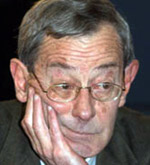According to the grant agreement between the World Bank and Recoverable energy and energy economizing foundation, Armenia will receive $3,1 million for helping needy citizens living in multi level buildings with gas and water supply services.
The idea of the program was thought up by a cooperating organization founded by the UK International Development department and the World Bank in 2003. According to the WB/Armenia PR officer Vigen Sargsyan, Armenia is the first country to receive such support from the mentioned organization. According to the head of the WB/Armenia, Roger Robinson, the number of beneficiaries of this program will cover 8000 families. It is worth mentioning that this program will be implemented in parallel to the WB program of heating, adopted in 2005. In the framework of that program last year they provided financial support covering $3 million for needy families. “Thanks to these two programs over 85000 citizens will have heating in their apartments”, says Mr. Robinson.
As to who will be eligible to get the support, that will be based on the family aid program, which Sargsyan likes the most: “The social security ministry has chosen the group of families to be included in this program in a duly manner”. What about the mechanisms through which these programs will be implemented? “We will not pay the expenses for gas. We will only provide capital support”, said head of energy economizing foundation, Tamara Babayan. These sums will be spent for the purposes of buying local heating facilities, installing them and joining the heating network.
Even though Mr. Robinson was doing his best to avoid discussing issues concerning the fifth energetic bloc of Hrazdan, it was discussed anyway. “Based on the information given to me by the government, I can say that this is a very good deal for Armenia. I think if all the presses were informed like I was, you would make the same assumption as I did”, said Mr. Robinson.
We wonder what kind of facts the authorities have given to Mr. Robinson and whether this information differs from the one given to the public.
According to the information of the WB/Armenia head, next week the Government will organize a public discussion dedicated to this issue. “The Government acts on behalf of the people and is held responsible for its actions. It will be good of them to discuss this issue with the society”, said Mr. Robinson.
Of course, we agree with Mr. Robinson that it will be good of them to do so, but on the other hand we wonder what the outcome of the discussion will be. What will we get out of it? The contract is already signed and the only way for it to be out of effect is if a negative opinion is expressed by the people. The only good thing in this discussion may be the possibility of being informed about the details that Mr. Robinson, on the basis of which we may agree with him that this was really a good deal for us.
We wonder why this institution doesn’t say anything about the governmental interference in economy and “the Armenian method of resisting the gas price increase”.
Mr. Robinson gave a very interesting explanation, “The other party of the deal has more resources than we have in the framework of this program. What’s wrong in having them wanting to do a good thing for Armenia?” Based on what Mr. Robinson said we may assume that they made Mr. Robinson believe that Russia helped us. On the other hand, whatever we do we can’t make such an assumption. Gazprom company will get its $110 for each cubic meter of gas anyway. What difference does it make if they get this money directly as money or indirectly as property? What was given for subsidizing this increase is not strategic for Russia, but it is strategic and very important for Armenia.
According to Mr. Robinson, the fact that almost all energetic power and potential of Armenia is under the control of Russia is not such a bad thing: “For instance the water supply services in Britain are carried out by several foreign companies, and this is normal”.
By coincidence in that period the public services regulatory commission was discussing the issue of increasing the water supply prices. Mr. Robinson was informed about this from journalists.
“Besides that, please don’t forget that most of energetic materials are imported from Russia: nuclear, gas, oil and other energetic materials. As for Armenia, the only energetic resource it has is water, which is used to operate hydroelectric stations. Anyone who speaks about gas should understand this reality”, said Mr. Robinson.
As for us, we’d first better confess that the only one we can condemn for such deals are we. As for the WB and other international institutions, they have the right to speak about such things as well as advise us what to do, simply because of the fact that they give us money.

